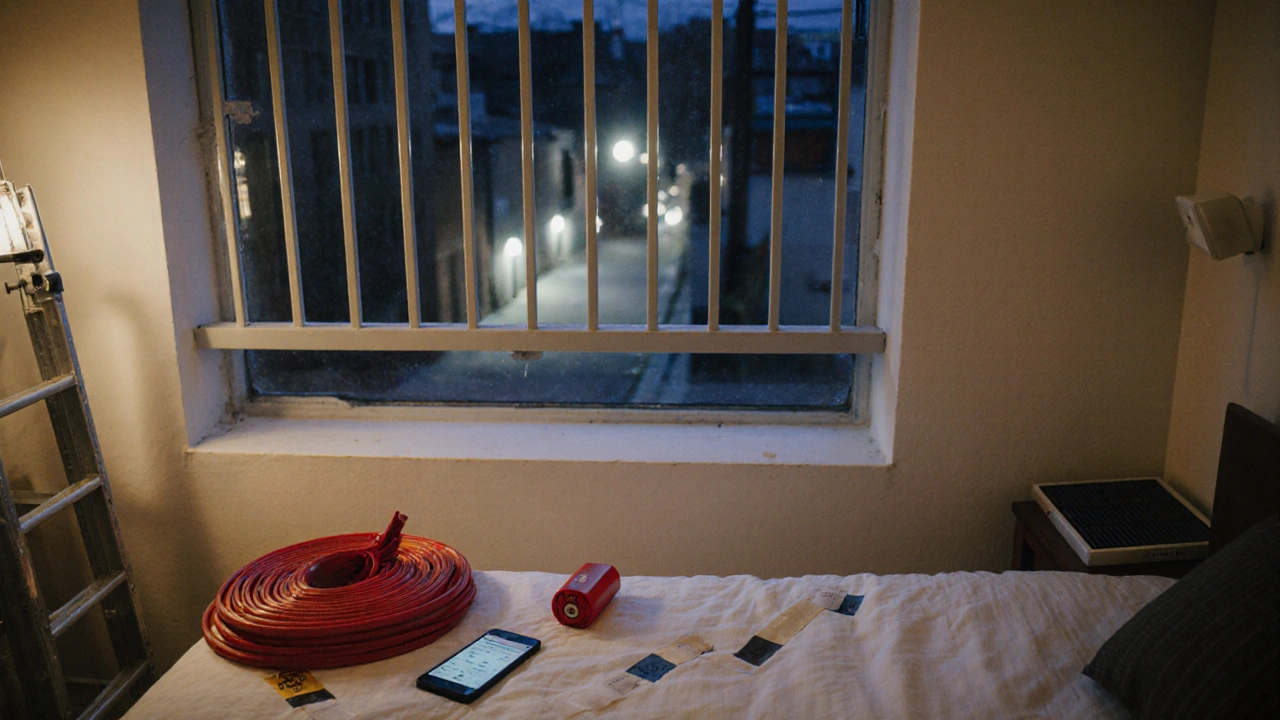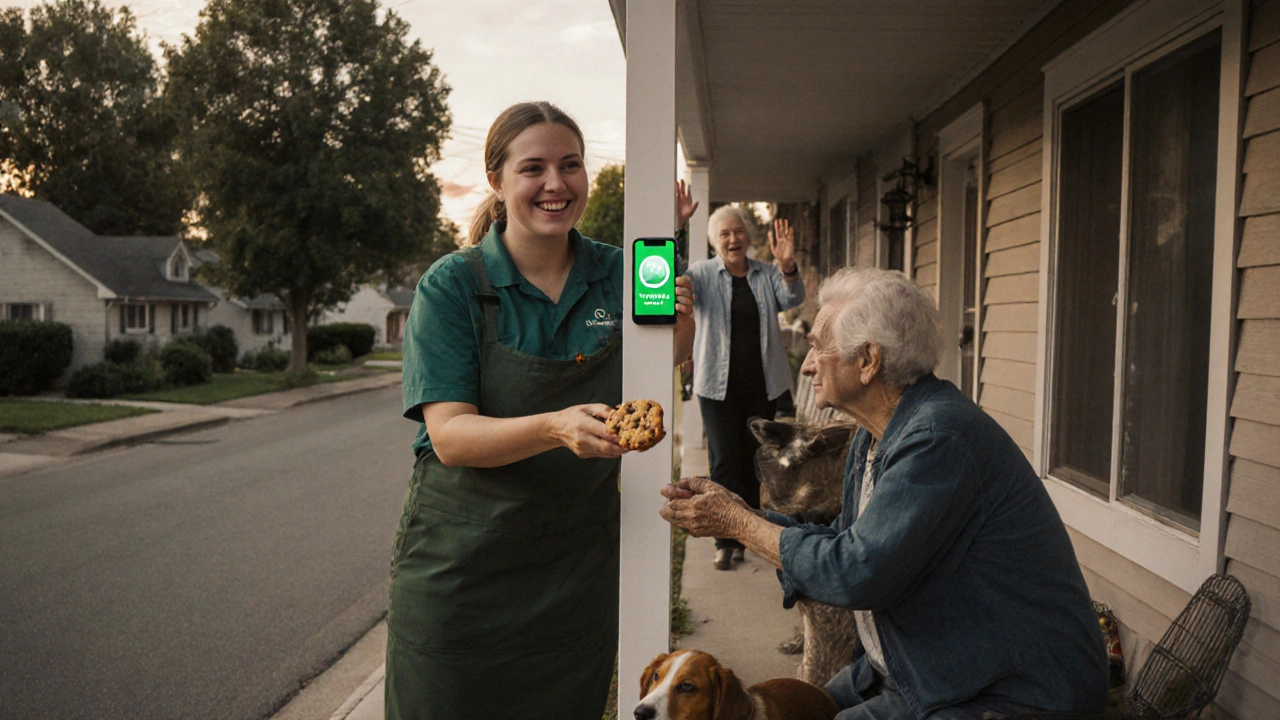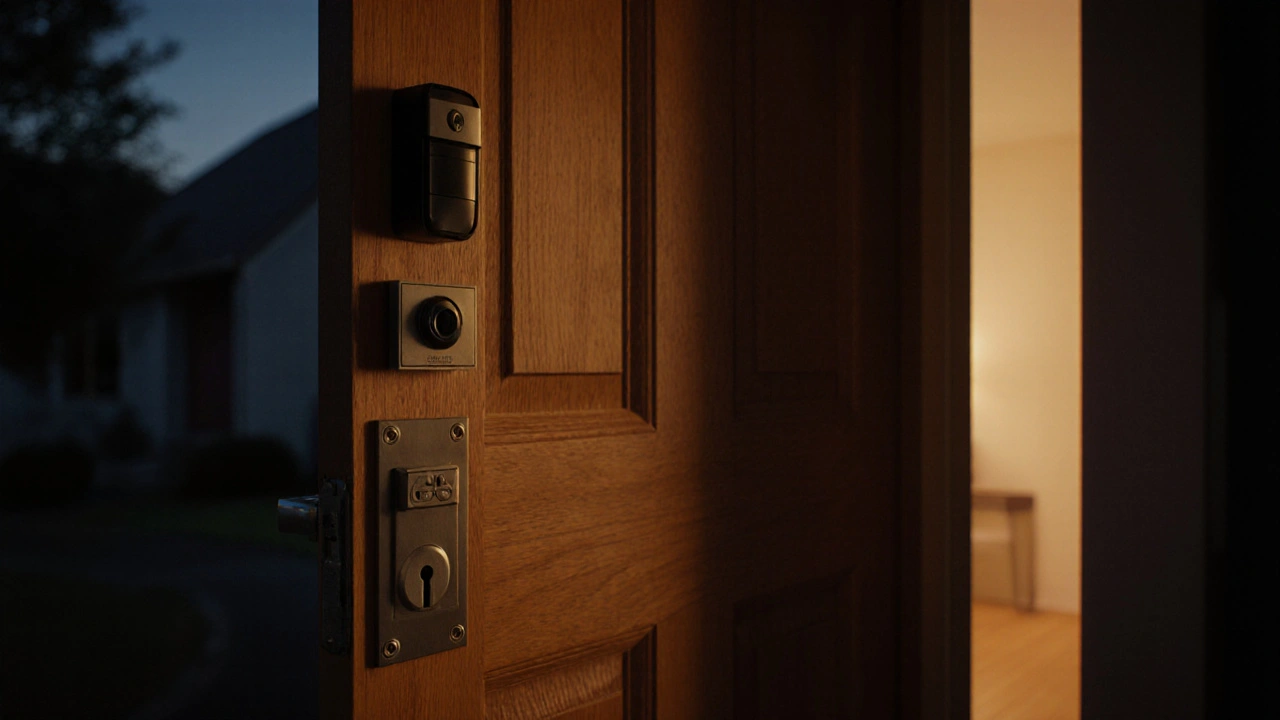Living safely as a sex worker isn’t just about who you meet-it’s about where you live. Your home is your sanctuary, your office, and sometimes your only shield. But too many people assume safety means locking the door and hoping for the best. That’s not enough. Real safety starts with how you design your entry, plan your exit, and handle the people living next door.
Secure Entry: Control Who Comes In
Your front door is your first line of defense. A heavy-duty deadbolt isn’t optional-it’s mandatory. Look for a deadbolt with a one-inch throw and a reinforced strike plate. Screw it into the wall stud, not just the door frame. If your door is hollow-core, replace it. A solid wood or metal door costs less than a night’s rent but can mean the difference between being safe and being trapped.Install a peephole with a wide-angle lens. Don’t rely on a door chain. Chains can be snapped, bent, or bypassed with a credit card. Instead, use a video doorbell with two-way audio. Ring, Arlo, or Eufy models work without a monthly fee if you use local storage. You can see who’s there, talk to them, and record the interaction-all without opening the door.
Never let someone in without confirming their identity. Use a code word system. For example, ask for their booking reference number or the name they used when scheduling. If they hesitate, refuse entry. No apology, no explanation. Your safety isn’t negotiable.
Exits: Always Have a Way Out
Most people think about the front door. That’s a mistake. In an emergency, the front could be blocked. You need at least one other exit. If you live in a house, check your back door. Is it locked? Can you open it from the inside without a key? If not, install a panic bar or a thumbturn lock.Windows are often overlooked. If you’re on the ground floor, install security bars with quick-release mechanisms. They keep people out but let you escape fast. If you’re on a higher floor, keep a fire ladder or rope in your bedroom. You don’t need to climb down-just know you can if you have to.
Plan your exit route before every client arrives. Know which door to use, where your phone is, and how to get to your car or a neighbor’s house. Practice it once a week. Muscle memory saves lives.
Keep a portable alarm in your pocket or taped under your bed. The kind that screams 120 decibels when you pull the pin. Not a tiny keychain buzzer. Something that makes neighbors stop and look. If someone tries to force you, activate it. Don’t wait. Don’t hope they’ll leave. Sound is your best weapon.
Neighbor Relations: Build Allies, Not Enemies
Neighbors aren’t just people who live nearby-they’re your early warning system. If you’re quiet, isolated, and never seen, you’re invisible. And invisibility makes you a target.Start small. Say hello when you see someone. Bring them cookies. Ask about their dog. Don’t mention your work. Just be a person. Over time, they’ll notice when something’s off. If you’re not home for three days, they might check in. If a stranger is hanging around too long, they might call the police.
Join your neighborhood group on WhatsApp or Facebook. Don’t post about your job. Post about lost cats, broken streetlights, or a new bike rack. Be the person who shows up when someone’s tree falls. When you’re visible as a community member, people care.
If you feel watched or followed, don’t ignore it. Talk to a neighbor you trust. Say, “I’ve noticed someone loitering near my place. Can you keep an eye out?” Most people will say yes. They don’t want danger in their neighborhood either.
Never tell your landlord you’re a sex worker. But if you have a problem-noise, leaks, broken locks-report it. Keep records. If they try to evict you, you have proof you’ve been a good tenant. In Australia, landlords can’t evict for lawful work, but they’ll try. Document everything.

Technology That Keeps You Safe
Your phone isn’t just for calls. It’s your lifeline. Install a safety app like bSafe, Circle of 6, or Safeture. Set up a timer. When you go in with a client, start the timer. If you don’t cancel it in 30 minutes, it automatically sends your location and a message to three pre-set contacts.Use a burner phone for work. Keep your personal phone locked in a drawer. If someone steals your phone, they won’t get your family, your bank, or your real name. Use Google Voice or a local SIM card with a fake name. You don’t need to be anonymous-you just need to be protected.
Install motion-sensor lights outside. Not just the front. The side, the back, the alley. Bright light makes it harder for someone to hide. Solar-powered ones are cheap and easy to install. No wiring, no electrician.
Use a smart plug to turn on a lamp or TV remotely. If you’re out, turn it on from your phone. It looks like someone’s home. Scammers and predators check for lights before approaching.
Red Flags You Can’t Ignore
Not every stranger is dangerous. But some signs are warning signs. If a client:- Refuses to give you a booking number or name they used
- Asks to come in before you’ve agreed on price
- Brings a friend without asking
- Is overly aggressive about touching or controlling the room
- Asks you to go somewhere else-your car, their place, a hotel
These aren’t just rude. They’re dangerous. End the interaction. Walk away. Don’t explain. Don’t apologize. Your time is worth more than their ego.
If you’ve ever felt uneasy after a client left, trust that feeling. It’s not paranoia. It’s your body reading danger before your brain catches up. Call a friend. Text a peer group. Don’t sit alone with that feeling.

What to Do If Something Goes Wrong
If you’re threatened, assaulted, or forced:- Get to a safe place immediately-even if it’s a neighbor’s house
- Call the police. Say, “I’m a sex worker and I’m safe now, but I need help.” You don’t have to explain your work. Just say you were in danger.
- Take photos of injuries, broken items, or the person’s car if you can.
- Text a trusted peer: “I need backup. Location: [address].”
- Save all messages, calls, and recordings. They matter.
In Australia, police are required to treat you with dignity under the Sex Work Act 1994. You have rights. You don’t need to be a victim to deserve help.
Building a Safety Network
You don’t have to do this alone. Join a peer network. In Perth, groups like SWOP WA and Scarlet Alliance offer peer support, safety training, and legal advice. They don’t ask for your name. They ask if you’re okay.Set up a check-in system with two other sex workers. Every night, text: “Home safe.” If you don’t reply by 11 p.m., they call you. If you don’t answer, they call the police. Simple. Reliable. Life-saving.
Know your local resources. In Western Australia, the Sexual Assault Resource Centre (SARC) offers free counseling and forensic exams-even if you don’t report to police. They don’t judge. They help.
Can I report a client who threatened me without getting in trouble?
Yes. In Australia, sex work is legal in Western Australia, and you have the same rights as any other citizen to report threats, assault, or coercion. Police are trained to handle these reports under the Sex Work Act 1994. You don’t have to reveal your full identity to get help. Many support groups can guide you through the process anonymously.
What if my landlord finds out I’m a sex worker?
Legally, they can’t evict you just because you’re a sex worker-unless you’re breaking other terms like causing noise, damage, or illegal activity. Keep your rental agreement clean. Pay rent on time. Report maintenance issues. If they try to force you out, contact Legal Aid WA or the Human Rights Commission. They can help you fight unlawful eviction.
Is it safe to live alone as a sex worker?
Many sex workers live alone safely. It’s about systems, not luck. Secure entry, multiple exits, safety apps, neighbor awareness, and a check-in network make it possible. Living alone gives you control. But never go without a safety plan. If you’re new, consider sharing a space with a trusted peer until you’re confident in your routines.
Should I use a fake name for my rental?
Using a legal name is required for leases in Australia. But you can use a professional name for communication with clients and avoid listing your work on any documents. Your landlord doesn’t need to know your job. Focus on being a quiet, reliable tenant. If you’re ever questioned, you can say you work in freelance services or remote tech.
What’s the most common mistake sex workers make with housing safety?
Waiting until something bad happens to act. Safety isn’t a one-time fix. It’s daily habits: checking locks, setting timers, talking to neighbors, practicing exits. The people who stay safe don’t have perfect homes-they have consistent routines. Start small. One lock. One app. One neighbor. Build from there.
If you’re reading this and feeling overwhelmed, know this: you’re not alone. Thousands of sex workers in Australia are doing the same thing-building safety, one step at a time. You don’t need to be fearless. You just need to be prepared.
